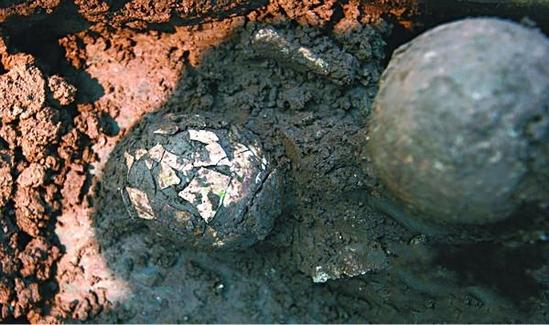 |
|
An egg more than 2,000 years old is excavated from a tomb in Tucheng town, Southwest China's Guizhou province, Aug 24. [Photo/www.gywb.cn] |
Researchers with the provincial institute of cultural relics and archaeology found the object in an ancient tomb from the Han Dynasty (202 BC to 220 AD) at Huangjinwan ruins.
"We tried to clean the mud on the shell. But as soon as the brush touched the shell, it cracked," said Zhang Gaike, who heads the excavation of the ruins that were discovered in 2009.
Zhang said the egg, filled with mud and soil, resembles a chicken egg in shape and size, adding that it was the first time that an egg has been found in an ancient tomb in Guizhou.
He said the discovery showcased different styles of tombs in Han and earlier dynasties of Shang and Zhou.
"During Shang and Zhou dynasty, people preferred being buried with delicate bronze wares. But in the Han, people brought daily necessities into their tombs," he said.
Zhang said they need more time to determine what type of egg it is and why the shell, supposed to be fragile and perishable, was preserved for such a long time.
Since the excavation of the tomb is not finished, the egg was left in the tomb.
Technicians have consolidated the surrounding soil to protect it. Covering about 40,000 square meters, the Huangjinwan ruins is the largest Han site that has been found in Chishui River basion.
|
|
|
|
|
|
|
|
